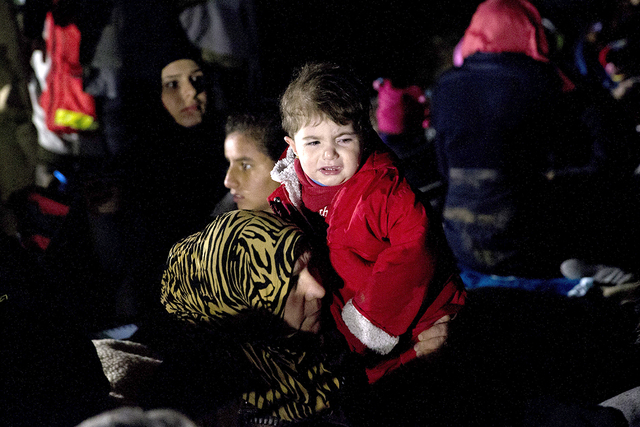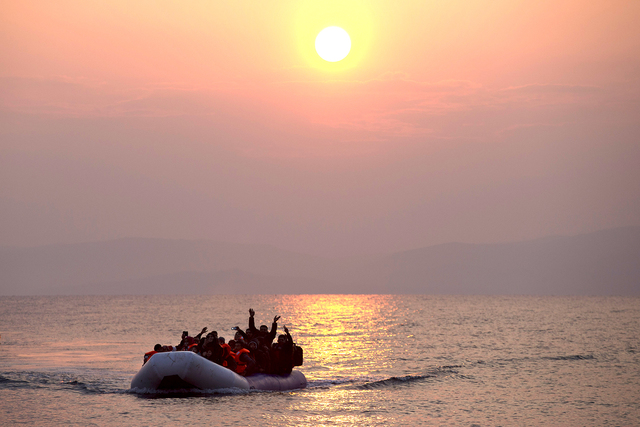ATHENS, Greece — Greece and the European Union scrambled on Sunday to put in place the people and the facilities needed to carry out a new deal intended to address the migrant crisis that is roiling Europe, as hundreds of
ATHENS, Greece — Greece and the European Union scrambled on Sunday to put in place the people and the facilities needed to carry out a new deal intended to address the migrant crisis that is roiling Europe, as hundreds of migrants in rubber dinghies continued to land on the Greek islands from Turkey.
The accord, struck between the union and Turkey on Friday, set a 12:01 a.m. Sunday deadline for Turkey to stem the flow of people making clandestine journeys across the Aegean Sea to Greece in an attempt to enter Europe, and required Greece to begin sending back migrants who are not eligible for asylum.
Yet processing centers on the Greek island of Lesbos and on several other Greek islands were not adequately staffed to comply immediately with the new measures, and officials said they were waiting for the European Union to follow through on a pledge to send at least 2,300 European police and asylum experts to help.
By Sunday afternoon, around 875 migrants in rubber boats had reached the Greek islands since midnight, the government said, despite an operation in Turkey that began Friday to detain migrants and the smugglers who make their journeys possible.
Many migrants landing on Lesbos on Sunday appeared to be unaware of the new policies and were reeling from their harrowing journey. Greek television showed black and gray rafts arriving at the island laden with people, some sobbing with relief at having reached Europe, and others nearly unconscious. Two little girls were found drowned, and two Syrian refugees died in the crossings over the weekend.
On Sunday, the Greek government began clearing out more than 6,000 migrants who had been waiting at processing centers and camps on several Greek islands, and transporting them on large ferries to Piraeus, the port of Athens, and to Kavala, a port in northern Greece. From there, they are to be sent to refugee camps recently set up around the country.
Nearly 50,000 migrants are stuck on the Greek mainland at camps, in Piraeus and on Greece’s northern border with Macedonia. More than 10,000 people have been living in miserable conditions in the Idomeni camp, on the Macedonian border, after west Balkan countries sealed their borders last month to cut the flow of migrants making their way to Germany and northern Europe.
Once emptied of their previous occupants, the migrant centers on the Greek islands are to be used only to process those who make it across the Aegean Sea through a phalanx of patrols run by Frontex, Europe’s border agency, as well as NATO and the Greek and Turkish coast guards.
The Greek authorities will register the migrants and process asylum applications. Migrants who do not apply for asylum or whose applications are rejected are to be returned to Turkey within two weeks. Under the accord, for every Syrian refugee returned to Turkey, the European Union will resettle one refugee directly from Turkey.
For the tens of thousands of other migrants stuck in camps around Greece, the situation is less clear. Many of them are Syrian and Iraqi nationals who, for the most part, are considered eligible for political asylum and a program that would relocate them across Europe.
Yet governments in several European countries recently began screening Syrians to determine whether the cities they came from were buffeted by conflict or considered “safe,” meaning that not all Syrians will be eligible for asylum.
In addition, around one-third of migrants in Greece are from Afghanistan. After several European countries last month abruptly reclassified the Afghans as “economic migrants,” most were disqualified from political asylum, and will most likely be repatriated. That process could be lengthy, even after help from other European Union countries arrives in Greece.
In the meantime, tensions have been flaring in some camps on the mainland as well as in Piraeus, where many migrants have been waiting, often for weeks, to find out if they will be able to cross the borders. On Friday, fights broke out between groups of Afghan and Syrian migrants in Piraeus, after a similar brawl the day before.
At the Idomeni camp on Sunday, Doctors Without Borders said 33 migrants had been treated for injuries inflicted by the Macedonian police as they tried to cross the closed border with Greece.




